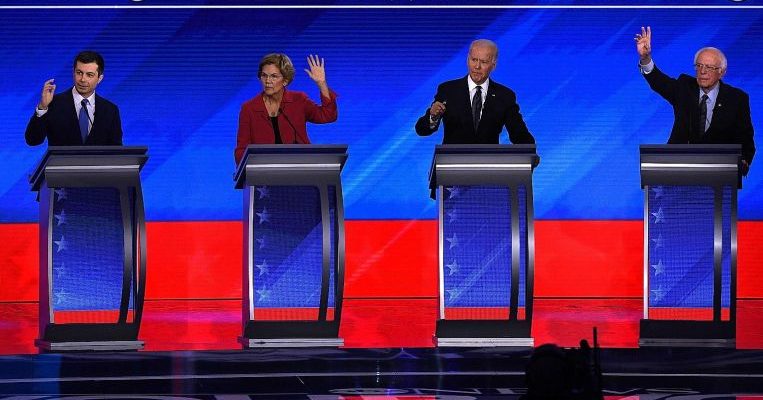
MANCHESTER (New Hampshire) • Iowa caucuses winner Pete Buttigieg and runner-up Bernie Sanders came under sharp and sustained criticism in a Democratic presidential debate, as rivals tried to stop their momentum by targeting Mr Buttigieg over his thin resume and ties to big donors while assailing Mr Sanders for his left-wing ideas and past opposition to gun control.
In the debate on Friday, the most contentious so far, their rivals in Iowa charged at Mr Buttigieg, the former mayor of South Bend, Indiana, and Vermont Senator Sanders, who appeared in the best position to win the New Hampshire primary on Tuesday and perhaps take command of the race.
Their opponents showed that they would not give up without a fight: Mr Buttigieg especially came in for bruising treatment, drawing tough challenges from every other candidate on stage, including over his criminal justice record as mayor and his failure so far to appeal to black and Latino voters.
Former vice-president Joe Biden, seeking to recover from his limp finish in Iowa, raised the issue of Mr Buttigieg’s lack of support among minorities, saying he had not shown he could “get a broad scope of support”.
Mr Biden repeatedly alluded to his own base among African-Americans, especially in South Carolina, whose primary is this month and is considered a political firewall if his flagging campaign does not recover before then.
He also warned that nominating Mr Sanders would taint down-ballot Democratic candidates with the label of socialism.
And in his most blunt attack so far on Mr Sanders, Mr Biden rebuked him for having opposed gun control legislation in the 1990s.
Mr Sanders, who has long since disavowed that stance, called it a function of representing “a very, very rural state”.
The gun issue was a major point of vulnerability for Mr Sanders in his 2016 bid for the Democratic nomination but until now had not been a significant part of the 2020 campaign.
For Mr Biden, and two other major candidates, Senators Elizabeth Warren and Amy Klobuchar, the debate was a crucial and perhaps final opportunity to reassert themselves in the race.
Yet despite the high stakes, there were no standout moments of the sort that have transformed past primaries, and the most aggressive of the seven candidates, Ms Klobuchar, is polling well behind the New Hampshire front runners.
Mr Sanders also took on Mr Buttigieg, despite having largely ignored him in previous debates.
When Mr Buttigieg attacked his signature healthcare proposal, Mr Sanders swiped at Mr Buttigieg’s close ties to “big money interests”. “I don’t have 40 billionaires, Pete, contributing to my campaign,” he said.
But Mr Buttigieg gave no ground, arguing determinedly for his own distinctive approach to the 2020 race. He batted away scepticism of his lack of service in the highest levels of government and rejected Mr Sanders’ demand for purity in political fund raising.
The Trump campaign would be coming at the eventual Democratic nominee with an immense war chest, he said, arguing that “we need to go into that fight with everything that we’ve got”.
And in a sign of his confidence in his positioning as a Washington outsider, Mr Buttigieg conceded the point on his lack of traditional qualifications for the presidency, seeming to imply that voters who were looking for a candidate with that profile already had an option in Mr Biden.
“I freely admit that if you’re looking for the person with the most years of Washington establishment experience under their belt, then you’ve got your candidate and of course it’s not me,” he said.
The debate came at a moment of tumult and anxiety for Democrats, whose lead-off contest in Iowa turned into a fiasco of technical breakdowns, stalled and fumbled vote counting and accusations of electoral illegitimacy from multiple presidential campaigns.
NYTIMES
SEE
